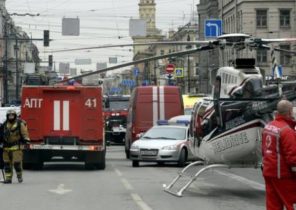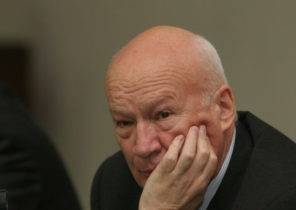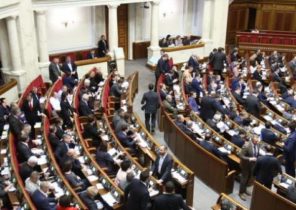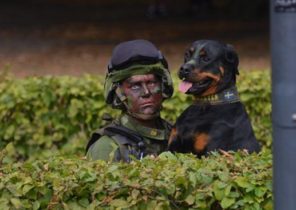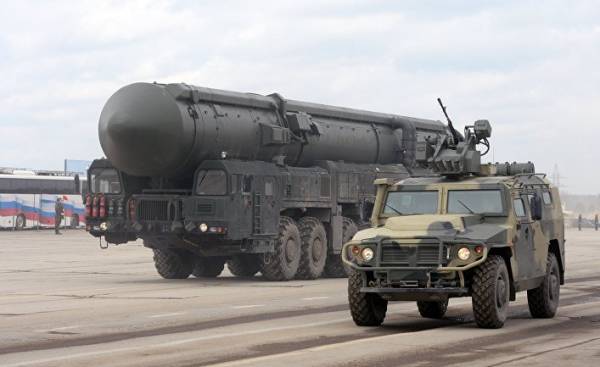
This week U.S. Secretary of state Rex Tillerson (Rex Tillerson), met in Moscow with Minister of foreign Affairs of Russia Sergey Lavrov — this will be the first official high-level dialogue between the administration of the tramp and Russia since the inauguration of President Donald trump.
Although the main topic of discussion is likely to be the use by the Syrian authorities of chemical weapons last week and its aftermath, the two diplomats will have to try to lay the foundations that will allow presidents to the Trump, and Vladimir Putin to implement a number of practical short-term measures to reduce the increasing danger posed by nuclear weapons.
Tillerson’s visit to Moscow comes amid significant tensions in bilateral relations caused by the crisis in Ukraine, the concentration of forces and means of NATO and Russia, and conduct their exercises near the common border between the Eastern members of the Alliance and Russia, and Russia’s intervention in the American elections.
The use by the Syrian authorities banned nerve gas last week in violation of the Convention on the prohibition of chemical weapons and the U.S. decision to strike in response to a strike on an air force base cruise missiles to Syria has exacerbated an already difficult situation.
Russia is the principal ally and patron of Syria. But she did not ensure compliance with Damascus its obligations in accordance with the agreement (adopted in 2013 with the mediation of Russia and the United States) not to use chemical weapons and to eliminate (with the possible control) the stocks of chemical warfare agents, their percursors and to destroy industrial capacity for their synthesis.
In Moscow, Tillerson needs to put pressure on the Russian leadership that it made his ward in Damascus to fulfill its obligations. This will require the support of Russia in the UN Security Council needed to ensure that the international inspectors were able to determine the nature and source perfect for last week’s chemical attack. You also need the cooperation of Russia with the West in order to eliminate all chemical weapons left in Syria.
The administration trump should identify their priority targets in Syria and to ensure that its policy did not lead to military confrontation with Russia, which was transferred to this country a considerable military force.
The avoidance of direct conflict between Moscow and Washington in Syria underlines the importance of another important issue that needs to be included in the agenda Tillerson and Lavrov this week — any confrontation between the two countries, whether in Syria or in other countries, carries a risk of escalation to nuclear war.
In the United States and Russia as the holders of more than 90% of the approximately one and a half thousand nuclear weapons on the planet have a special responsibility to ensure a stable strategic relations and reduce the risk of outbreak of nuclear war. These two countries have a long experience of cooperation in this area in the name of global security.
Although in some areas of constructive cooperation continues, for example, complied with the conditions of the Treaty on strategic arms reduction 2010 reduction Treaty (start-3), signed and implemented in 2015, the agreement on the Iranian nuclear program, the risks of unrestrained nuclear arms race is unacceptably high.
Both sides continue to adhere to the policy and military strategy of the nuclear powers that enables each of them to launch hundreds of missiles within a few minutes after the decision. These two countries also spend hundreds of billions of dollars, feverishly taking ambitious attempts to maintain and upgrade their nuclear arsenals at levels substantially exceeding reasonable requirements of security and defense. Work on development of further measures of nuclear arms control with the aim of reducing these “bloated” arsenals actually stopped amid disagreements between the U.S. and Russia on missile defence, advanced conventional weapons and other issues.
The situation is aggravated by the fact that the United States accused Russia of conducting tests and the deployment of cruise and land-based missiles, in violation of the Treaty on the elimination of intermediate-range and shorter-range nuclear forces (INF) in 1987. Moscow denies its non-compliance with the terms of the contract and instead accused it of violating Washington. In addition, US officials and NATO have expressed concern over the fact that Russia is developing new nuclear weapons and lower the threshold of its intended use.
The administration of the tramp, for its part, has not yet developed a clear policy towards Russia or the strategy for the reduction of nuclear risks. Although the President, trump said that he would like to improve relations with Moscow, and the global nuclear weapons stockpiles should be reduced significantly, he also promised to strengthen and expand the US nuclear capacity. He opposed the Treaty on strategic arms reduction (start-3) and, reportedly reacted negatively to Putin’s proposal to extend the validity of this agreement.
In his meeting this week Tillerson and Lavrov is to discuss possible decisions that parties may take to reduce the risk of use of nuclear weapons, strengthen existing mechanisms of arms control and the elimination of obstacles to the adoption of new risk reduction initiatives.
One of such solutions is to prepare the ground for a joint statement trump and Putin, in which they confirm the statement made in 1985 by U.S. President Ronald Reagan and Soviet leader Mikhail Gorbachev that “nuclear war impossible to win and lead in any case impossible.” The two leaders also need to create a new channel for dialogue on issues affecting the bilateral strategic relations, including on missile defence, advanced conventional weapons and means and methods of conducting offensive operations in cyberspace.
Second, Tillerson and Lavrov should start discussion on the extension of the new start Treaty and the provisions on monitoring compliance for five years, as permitted under the contract. Against the background of deteriorating relations between the US and Russia, the value of this agreement, which limits and allows you to control arsenals of strategic nuclear weapons deployed by each of the parties has increased. The renewal of this contract will also facilitate the discussion of further reductions in arsenals of USA and Russia that will lead to significant savings.
Thirdly, the two countries need to work to preserve the INF Treaty. If the problems aren’t solved subject to the conditions of this agreement, threatening its existence, it could unleash a new arms race for supremacy in the possession of an expensive medium-range missiles, which will adversely affect security in Europe and Asia.
The main obstacle in resolving problems related to the implementation of the Treaty, is not a lack of opportunities, and the unwillingness of Russia to recognize the concerns of the United States. To increase the pressure on Russia and to create conditions in which Moscow will be harder to deny the facts of its violation of the Treaty, the U.S. government should be more transparent and talk to the American people and US allies about the nature of those violations — which the Obama administration do not want.
In addition, Tillerson should make it clear to Lavrov that if Russia will continue to violate the Treaty, the United States will take steps to confirm and reinforce their obligations to protect NATO allies threatened by missiles, designed or placed in breach of contract.
Due to the rapid deterioration of U.S.-Russian relations, the task of reducing the nuclear threat becomes even more important. It is time to act for the sake of the common cause — or an extremely difficult situation becomes even more dangerous.
Kingston Reif is a member of the Association for arms control, programme Manager, implement the policy of disarmament and threat reduction. Maggie Tennis — fellow of the Association for arms control, the winner of the grant for peace. Herbert Scoville, Jr.
